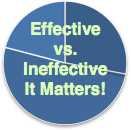The teacher tenure law in California has been determined to be unconstitutional, based on the state constitution's guarantee of equal education opportunity. The argument is that this guarantee has some level of quality expectations, with students at least being able to receive an education that is adequate.
For a student to receive an adequate or equal education, is a higher quality teacher required?
Why do low performing schools seem to have the highest quantity of underperforming teachers?
Do bad teachers gravitate toward schools where the student learning gaps are greatest?
Does teacher tenure somehow activate or cause this scenario?
A core part of the argument against teacher tenure in this legal proceeding is the research study produced by economist Raj Chetty of Harvard University, which, among other remarkable findings, revealed that 3% of public school teachers in California are highly ineffective. Is that such a low number that it's irrelevant? Not if that's your child in that classroom, and especially not if you consider that 3% equates to 8,250 highly ineffective teachers in the state corrupting the minds of 260,000 students each year! That amounts to $11.6 BILLION in lost income for these students over their lifetimes because it's very difficult to make up for these deficiencies in instruction. The research from Mr. Chetty appears to be widely respected as sound insight regarding the long-term impact of education leadership decisions.
Additional money doesn't necessarily produce an increase in student learning, but consistent increases in the quality of the school design, backed by sufficient funding and leadership discipline, will improve the economic opportunity for each student and the communities in which they live.
Additional hiring/firing options don't necessarily mean an increase in quality. The quality of teachers in California public schools will not increase by default with the removal of teacher tenure. Teacher tenure isn't a guarantee of employment, but a guarantee of due process in support of Academic Freedom. The benefits of such freedom are overstated by teachers unions and especially by higher education organizations on university campuses, and are used as an excuse for impeding improvements in school design.
Even in states/districts where teacher tenure is no longer an issue that limits administrative decisions regarding personnel, the percentage of ineffective teachers is too high. Overall, school administrators and school boards lack sufficient quality in their processes for recruiting, assessing, and coaching teachers. The lack of commitment to faculty quality and culture, in both public and private schools, is stunning given the impact this has on students and everyone else involved in the school community.
It takes courageous leadership in the board room, the school office, and in the classroom to produce consistently great schools.



